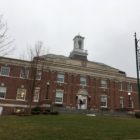Government
‘This Is Completely Inappropriate’: Sober House Operators, Neighbor Fail To Reach Accord
|
Though they had appeared close to reaching an agreement, the operators of a sober house on West Road home and a neighbor appealing the town’s decision to allow it have failed to reach an accord, representatives said during a public hearing last week. Now, the question of whether the sober house may continue to operate—or, more likely, under exactly what conditions it will continue—is entirely in the hands of town officials who heard attorneys from both sides make their cases at a June 5 meeting of the Zoning Board of Appeals. During an unusual ZBA hearing that featured spirited interruptions and apologies, appellant Thom Harrow told board members that the owners of The Lighthouse proposed a series of conditions under which they agreed to run a sober house living facility for men at 909 West Road. According to Harrow, just one point of disagreement remained at the time the ZBA hearing opened—a question of whether six or eight clients would be allowed in the 8,000-square-foot home at one time. Harrow, Lighthouse officials and various attorneys took a break following an initial part of the hearing—ostensibly to sort out that final matter.



